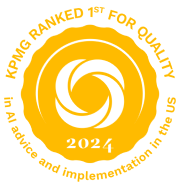AI Agents Transforming Workforce Strategies for the Future
Three key strategies for integrating AI agents into a hybrid human-digital workforce to enhance productivity and innovation.
How AI is Reshaping Talent Decisions
AI-powered digital labor, particularly AI agents, is rapidly becoming a reality, disrupting traditional workforce planning. Companies must now focus on securing skills rather than just filling roles, deciding whether humans or digital entities are best suited for specific tasks. This shift has significant implications for HR leaders as they transition to a hybrid human-digital workforce to optimize both routine and complex tasks.
Redefining Workforce Dynamics with AI Agents
85% of organizations have already started implementing AI into their business operations, with 47% leveraging AI for workforce planning and management (KPMG AI Pulse Survey Q1, April 2025).
Unlike ChatGPT tools, AI agents are designed to collaborate directly with humans or operate autonomously. They act independently to achieve goals, whether analyzing data, running processes, or finding information. As AI agents mature, organizations must refine their talent strategies to balance human and digital roles, including upskilling, performance measurement, and workforce planning.
Three Key Implications for Talent Strategy
1. Orchestrate Work Across Human and Digital Labor
Integrating AI agents requires meticulous workforce analysis. Organizations must redefine roles and structures, considering how AI agents interact with people, technology, and leadership.
Companies reported an average 35% increase in productivity after integrating AI agents (KPMG AI Pulse Survey Q1, April 2025).
Adoption strategies should prioritize upskilling, change management, and continuous learning platforms to foster a culture of experimentation and trust.
2. Manage Digital Talent Like Human Talent
AI agents should be treated as team members, with clear roles, responsibilities, and reporting lines. Organizations must onboard, upskill, and measure the performance of digital talent just as they do for humans.
62% of organizations use AI to identify skill gaps and develop targeted upskilling programs (KPMG AI Pulse Survey Q1, April 2025).
Resistance may arise as employees adjust, so robust change management is critical.
3. Embrace Continuous Workforce Planning
In the age of AI, five-year workforce plans are obsolete. Companies must adapt in real time, with continuous feedback loops to address dynamic needs.
69% of companies plan to integrate AI-powered continuous learning platforms within two years (KPMG AI Pulse Survey Q1, April 2025).
Related News
SoftBank CEO Predicts AI Agents Will Revolutionize Digital Labor
SoftBank Corp. CEO Junichi Miyakawa highlights the transformative potential of AI agents as digital labor, surpassing previous Industrial Revolutions in impact.
Skills-based strategy key to integrating AI agents into workforce
Organizations must adopt a skills-based approach to manage AI agents as digital employees, ensuring seamless integration with human workers, says Workday executive.
About the Author

Alex Thompson
AI Technology Editor
Senior technology editor specializing in AI and machine learning content creation for 8 years. Former technical editor at AI Magazine, now provides technical documentation and content strategy services for multiple AI companies. Excels at transforming complex AI technical concepts into accessible content.
